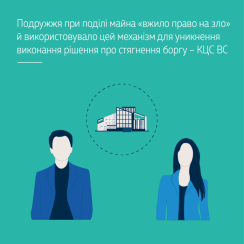Contact center of the Ukrainian Judiciary 044 207-35-46
ABOUT THE SUPREME COURT
FOR CITIZENS
ACTIVITY
PRESS-CENTER

The court of first instance, whose decision was upheld by the appellate court, satisfied the claim for the recognition of ownership of 1/2 of the property and the removal of the arrest from it. The judgments were substantiated by the fact that the land plots had been acquired, and the entertainment complex had been built for the common funds of the spouses during the period of their cohabitation.
The Supreme Court composed of a panel of judges of the Second Judicial Chamber of the Civil Cassation Court overturned the judgments and dismissed the claim, taking into account the following.
In May 2011, the marriage between the spouses was dissolved by a court decision in absentia, and in November 2019, at the request of the wife, the court canceled this decision, accepted the husband's refusal from the claim for divorce, and closed the proceedings.
In 2007, the husband bought two plots of land for personal farming. In 2010, the village council transferred a land plot into his ownership. The husband built a mall on it, and in August 2011 he received a certificate of ownership of the building.
Pursuant to the court’s judgment to recover the money debt from the husband, in 2017 and 2018 all immovable property belonging to him was seized.
The Supreme Court concluded that the courts of previous instances had failed to pay attention to the following:
At the same time, the Supreme Court stressed that the actions of participants in civil relations must be bona fide, i.e. meet a certain standard of conduct, characterized by honesty, openness and respect for the interests of the other party to the contract or the relevant legal relationship. Actions of a person committed with intent to cause harm to another person, as well as abuse of rights in other forms (part 3, Article 13 of the Civil Code of Ukraine) are also not allowed.
Resolution of the Supreme Court of August 11, 2021, in case No. 723/826/19 (proceedings No. 61-8810св20) – https://reyestr.court.gov.ua/Review/99037704.